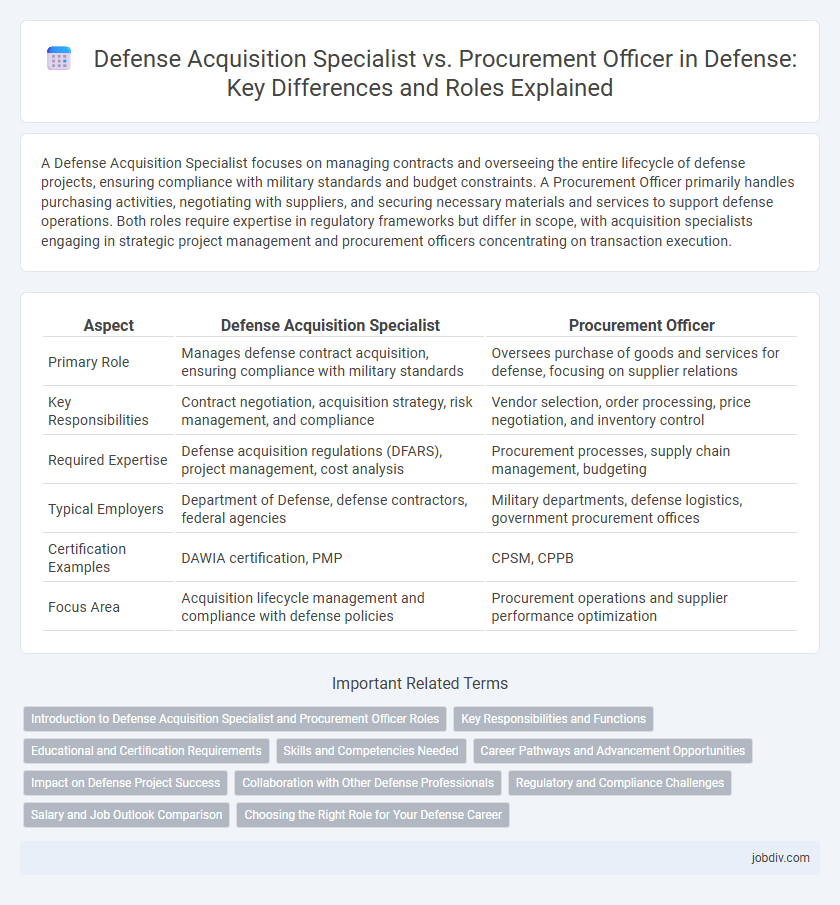A Defense Acquisition Specialist focuses on managing contracts and overseeing the entire lifecycle of defense projects, ensuring compliance with military standards and budget constraints. A Procurement Officer primarily handles purchasing activities, negotiating with suppliers, and securing necessary materials and services to support defense operations. Both roles require expertise in regulatory frameworks but differ in scope, with acquisition specialists engaging in strategic project management and procurement officers concentrating on transaction execution.
Table of Comparison
| Aspect | Defense Acquisition Specialist | Procurement Officer |
|---|---|---|
| Primary Role | Manages defense contract acquisition, ensuring compliance with military standards | Oversees purchase of goods and services for defense, focusing on supplier relations |
| Key Responsibilities | Contract negotiation, acquisition strategy, risk management, and compliance | Vendor selection, order processing, price negotiation, and inventory control |
| Required Expertise | Defense acquisition regulations (DFARS), project management, cost analysis | Procurement processes, supply chain management, budgeting |
| Typical Employers | Department of Defense, defense contractors, federal agencies | Military departments, defense logistics, government procurement offices |
| Certification Examples | DAWIA certification, PMP | CPSM, CPPB |
| Focus Area | Acquisition lifecycle management and compliance with defense policies | Procurement operations and supplier performance optimization |
Introduction to Defense Acquisition Specialist and Procurement Officer Roles
Defense Acquisition Specialists manage complex procurement processes for military systems, ensuring compliance with federal regulations and optimizing lifecycle management of defense contracts. Procurement Officers focus on acquiring goods and services within budget constraints while maintaining transparency and efficiency in contract execution. Both roles require expertise in acquisition strategies, contract negotiation, and regulatory frameworks essential to defense sector operations.
Key Responsibilities and Functions
A Defense Acquisition Specialist manages the lifecycle of defense systems, focusing on contract management, technical evaluation, and ensuring compliance with defense acquisition regulations. Procurement Officers oversee purchasing processes, supplier negotiations, and inventory control to secure necessary materials and services within budget constraints. Both roles require coordination with military and contractors, but Acquisition Specialists emphasize program management and strategic planning, while Procurement Officers concentrate on transactional purchasing and supply chain efficiency.
Educational and Certification Requirements
Defense Acquisition Specialists typically require a bachelor's degree in fields such as engineering, business, or logistics, often supplemented by specialized certifications like the Defense Acquisition Workforce Improvement Act (DAWIA) certifications that validate expertise in acquisition processes. Procurement Officers generally hold degrees in business administration, supply chain management, or related disciplines, with certifications such as Certified Professional Public Buyer (CPPB) or Certified Federal Contracts Manager (CFCM) enhancing their procurement and contract management capabilities. Both roles demand a strong understanding of federal acquisition regulations, but Defense Acquisition Specialists emphasize comprehensive acquisition strategy and program management education aligned with Department of Defense (DoD) mandates.
Skills and Competencies Needed
Defense Acquisition Specialists require in-depth knowledge of defense contract regulations, systems engineering, and project management to oversee complex weapons and technology acquisitions. Procurement Officers focus on negotiation skills, supplier relationship management, and compliance with federal acquisition laws to ensure cost-effective and timely procurement of defense supplies. Both roles demand strong analytical abilities, attention to detail, and proficiency in risk assessment to support strategic defense objectives.
Career Pathways and Advancement Opportunities
Defense Acquisition Specialists focus on managing complex defense contracts and navigating regulatory compliance, often progressing towards roles like Contracting Officer or Program Manager within defense agencies. Procurement Officers handle the purchasing of goods and services with an emphasis on cost-efficiency and supplier relationships, typically advancing to senior procurement manager or supply chain leadership positions. Career pathways for both roles emphasize certifications such as DAWIA for Acquisition Specialists and CPP or CPSM for Procurement Officers, enhancing advancement opportunities in government and defense sectors.
Impact on Defense Project Success
Defense Acquisition Specialists bring in-depth knowledge of military requirements and technical specifications, directly influencing the precision and effectiveness of defense project outcomes. Procurement Officers focus on the strategic sourcing and contract management necessary to secure materials and services within budget constraints, ensuring timely project delivery. Collaboration between both roles maximizes resource allocation and mitigates risks, significantly enhancing overall defense project success.
Collaboration with Other Defense Professionals
Defense Acquisition Specialists and Procurement Officers collaborate closely with military strategists, logistics experts, and contract administrators to ensure the timely and effective acquisition of defense systems. Their joint efforts in integrating technical requirements and procurement regulations optimize resource allocation and mission readiness. This collaboration enhances interoperability, cost-efficiency, and compliance with federal acquisition regulations within defense projects.
Regulatory and Compliance Challenges
Defense Acquisition Specialists navigate complex regulatory frameworks such as the Federal Acquisition Regulation (FAR) and the Defense Federal Acquisition Regulation Supplement (DFARS), ensuring strict compliance with government mandates throughout the procurement lifecycle. Procurement Officers face challenges in aligning procurement activities with budgetary constraints, audit requirements, and ethical guidelines while managing supplier relationships and contract execution. Both roles require thorough understanding of statutory obligations, risk management protocols, and continuous updating of compliance practices to prevent legal and financial repercussions in defense acquisitions.
Salary and Job Outlook Comparison
Defense Acquisition Specialists typically earn median salaries ranging from $85,000 to $110,000 annually, reflecting their specialized expertise in managing defense contracts and compliance with federal acquisition regulations. Procurement Officers in the defense sector generally earn between $70,000 and $95,000 per year, with salary variations depending on experience and level of responsibility in sourcing military equipment and services. Job outlook remains strong for both roles due to ongoing government defense spending, with Acquisition Specialists experiencing a slightly higher demand driven by complex contract management and regulatory oversight requirements.
Choosing the Right Role for Your Defense Career
Defense Acquisition Specialists focus on managing complex government contracts, ensuring compliance with federal acquisition regulations and optimizing procurement strategies for defense programs. Procurement Officers handle the purchasing process, negotiating contracts and vendor relationships to acquire defense materials and services efficiently. Choosing between these roles depends on whether you prefer strategic contract oversight or operational purchasing responsibilities within the defense sector.
Defense Acquisition Specialist vs Procurement Officer Infographic

 jobdiv.com
jobdiv.com